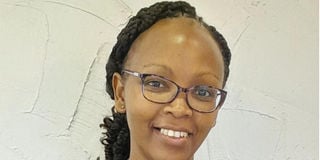The money mistakes I have learned from as a finance manager

Jane Wanjugu is the Finance Manager at Kenya Orient Life Assurance Limited Photo|Pool
What you need to know:
- Jane Wanjugu is the Finance Manager at Kenya Orient Life Assurance Limited
My career started as an intern at the East African Wildlife Society, a non-government organization. I then transitioned to general insurance at Kenya Orient Insurance Limited as an accounts assistant then progressed to the role of a senior accounts executive at the same company before moving to life insurance at Kenya Orient Assurance Limited, where I have worked as a financial accountant, assistant finance manager, and now my current role of finance manager.
The main challenge I have faced in my role has been establishing a finance department from scratch. This required extensive research to ensure the right structures and processes were implemented. With the help of God and the rest of the team, we were able to put things in place. Financial reporting and regulations have also evolved with time and this development has forced me to ensure that I strive to be up to date with the sector’s changes.
My biggest money mistake happened when I took up an investment without prior budgeting. I signed up for a life policy that required me to contribute monthly instalments which affected my monthly expenditures. I ended up not being able to comfortably contribute towards my life policy cover and cater for my expenses. As a result, I was forced to cancel the policy. I ended up losing all the money I had initially channelled toward it since the policy had yet to realise a cash value. I have since learnt from that mistake and adopted proper budgeting.
My greatest career moment has been the transition from International Financial Reporting Standards (IFRS) 4 to IFRS 17 reporting. This type of reporting helps investors and others better understand insurers’ risk exposure, profitability and financial position and one of my major roles now is to prepare financial statements and reports by these standards. This has involved months of extensive training and consultations with the actuaries and peers in the industry. This has been a great achievement in my career.
Key on the list of what I would do differently would be my approach to investments. I would apply the 50:30:20 budgeting rule. This is a budgeting technique that helps in managing money more effectively and sustainably. It involves dividing your money into three primary categories based on your after-tax income: 50 percent to needs, 30 percent to wants, and 20 percent to savings and debt payments.
I have two channels where I save money; In a bank account that pays a rate of return for the balance held and in a money market fund which has proven to be effective in helping me earn a return on interest. Previously I would save money in an account with no rate of return which turned out to be ineffective because my money would decrease through standard charges.
Never live beyond your means. Avoid instant gratification. Everything we see as successful today has taken time and effort to get to where it is. Learn to go through the process as per the saying; ‘Easy come, easy go’.





